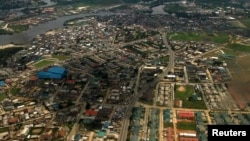The nuclear deal with Iran announced Tuesday might be a political win for U.S. President Barack Obama, but it could be a major loss for oil-producing Nigeria.
The towers of banks and conglomerates punctuate the skyline of Nigeria’s commercial hub, Lagos. But make no mistake: it is oil that keeps Africa’s largest economy running.
Sales of crude make up about 70 percent of government revenue. Last year’s global drop in the price of oil delivered a blow to Nigeria’s economy. Soon after taking office, President Muhammadu Buhari described the treasury as “virtually empty.”
Now, analysts say there’s a new threat to Nigeria’s economy: Iran.
The nuclear deal between the Islamic Republic and a group of six nations would, among other things, ease the international economic sanctions imposed on the country. That would mean Iran would have greater access to markets for the 3.1 million barrels of crude oil it produces each day.
That jump in supply could see Nigeria’s revenues dwindle as the price of crude drops, says the CEO of Lagos-based Financial Derivatives Company Limited, Bismarck Rewane.
“It is, to a large extent, depending on how low the price goes, it is a game-changer,” he said.
A drop in oil prices could not come at a worse time for President Buhari. He campaigned on expensive promises like destroying the Boko Haram insurgent group, rebuilding Nigeria’s war-torn northeast and rehabilitating the country’s derelict oil refineries, which process only a fraction of the crude Nigeria produces.
But with money tight and expected to get tighter, Rewane says the administration will have to borrow and spend wisely.
“So there will be two approaches," he said. "One is being more prudent in what you have. And second, borrowing to spend on impactful investments in the infrastructure space.”
Numerous hurdles remain to the Iran deal’s implementation, perhaps none greater than the approval by the U.S. Congress.





